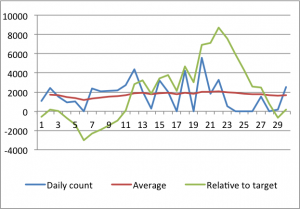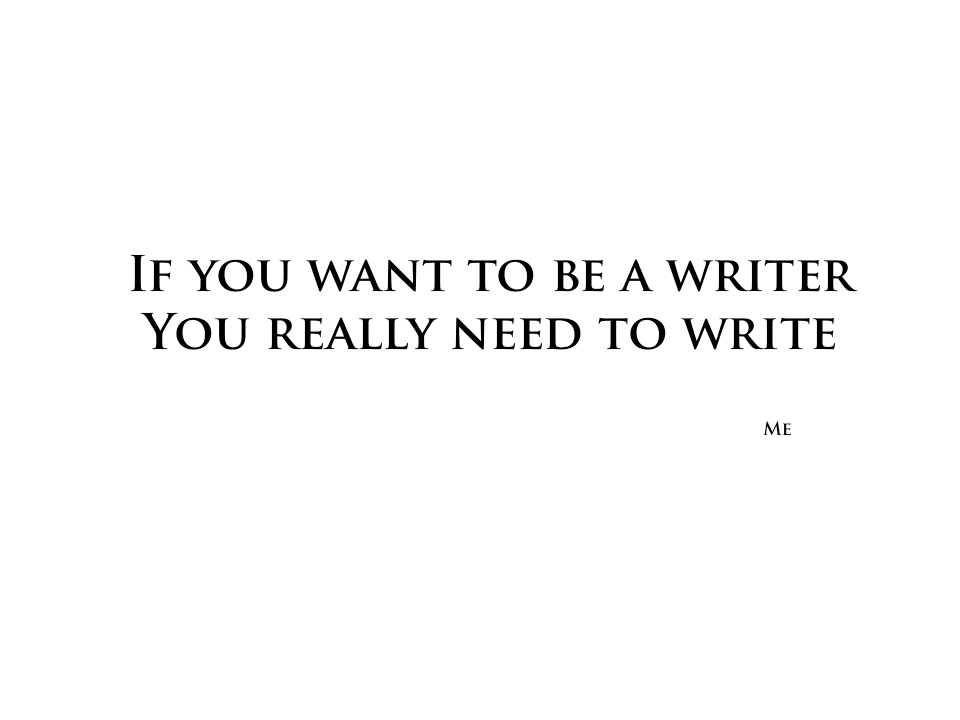The drab greyness of early winter paints everything with a dour patina, but the bright chirrups of starlings on the telephone wire bursts the leaden bubble and brings brightness to a dull and sombre day.
NaNoWriMo 2014 – it’s all over (almost)
So, NaNoWriMo is all but over for another year. I validated my word count (and downloaded my certificate and winners’ badges) at around 3.30pm today (30th November). But it wasn’t really that close. I had started a #50k5days project (yes, writing 50,000 words in 5 days) which I wasn’t able to successfully complete, and I had over 27k words on that for the month, too. But I wanted to finish the NaNo with a ‘proper’ 50k words.
 Regarding NaNoWriMo itself, I wrote a first half or so of a novel City in Flames, another apocalyptic ‘The world in going to end’ novel which will fit quite nicely into the, as yet, unpublished End Of Civilisation series. My writing pace was a bit all over the place (see graph to the side): the blue line is my daily word count, the red line the average over the month, and the greeny line is words ahead of / behind target. But it’s done, and this is my 10th ‘win’ in 11 attempts. And, for the first time, I don’t hate my story. Previous NaNo ‘things’ have been despised by me, and grinding out the words has been a trial. But not this time. I had a good story, I had reasonable characters, and an active timeline which makes the story work well as a thriller. At least, I think so. I’ll be continuing to write this.
Regarding NaNoWriMo itself, I wrote a first half or so of a novel City in Flames, another apocalyptic ‘The world in going to end’ novel which will fit quite nicely into the, as yet, unpublished End Of Civilisation series. My writing pace was a bit all over the place (see graph to the side): the blue line is my daily word count, the red line the average over the month, and the greeny line is words ahead of / behind target. But it’s done, and this is my 10th ‘win’ in 11 attempts. And, for the first time, I don’t hate my story. Previous NaNo ‘things’ have been despised by me, and grinding out the words has been a trial. But not this time. I had a good story, I had reasonable characters, and an active timeline which makes the story work well as a thriller. At least, I think so. I’ll be continuing to write this.
 Oh, and thanks to a very kind offer, I have a cover done for me by Rivka Kawano over at http://www.authorsensei.com/cover-design–illustration.html
Oh, and thanks to a very kind offer, I have a cover done for me by Rivka Kawano over at http://www.authorsensei.com/cover-design–illustration.html
Social activities? I went to the Essex NaNo group Kickoff party, and it was great to see some existing friends and meet new ones. Well done @em_biddulph for taking on the role of Essex ML once again, and for organising so many events. The NaNoEssex Facebook page was lively and interesting, too.
This year saw the official introduction of a Suffolk region, and as I’m almost literally a stone’s throw from Suffolk (well, a very hard throw of a very small stone), I joined that group, too, under the watchful eye of their ML, Sarah. I went to a few of their write-ins, and they had a very active Facebook page, too. I was happy to join a group of word sprinters on there to push my word count along. So the social aspects of NaNoWriMo were very enjoyable again.
Regarding #50k5days, I began the month trying to find 5 consecutive days where I could dedicate my time to writing ten thousand words each day, but that was difficult. So I announced I would be doing it piecemeal during the month. And then, I left it to the last minute, so I was using the last 5 (consecutive) days for writing this. I started day 1 with over 8k, then 10k on day 2, then a disappointing 7.4k for day 3, when real life got in the way. Day 4 was an almost complete bust at 2k, and at that point, I abandoned. But here again, I have what I think will make a good story, and the writing I’ve done is as near as a good edit / rewrite from a finished draft as I’ve ever done. So double positive.
And what now?
I’ve started a “Write.A.Page.A.Day” group on Facebook (https://www.facebook.com/groups/write.a.page.a.day/ if you’re interested), with the intention of encouraging authors (me, mainly) to keep writing during the days and weeks after the end of NaNo.
I have my Writer-Chat shows http://writer-chat.com/ where I will spread my chatty net wider, beyond my NaNo buddies, haranguing published authors onto the ‘air’ with me. I’ve invested some money in audio equipment, so I’m intending to increase the professionalism of the show as we continue. I want to provide podcasts of them in the future, too.
“What about publishing”, I hear you cry? (I hear stuff all the time, it’s okay). I was hoping to publish three things this year. So far, I’ve published … nothing. Another target missed. My collaborative slasher horror is in second edit. I have three completed first drafts, waiting for me to return to them – one is crime, which might get my attention first, and t’others are apocalyptic thrillers, which need a bit more work. So it’s all there, or thereabouts.
And sleep. I need better sleep. I had too many late nights attempting to meet wordcount targets. I watched with interest as the quality of my writing curved downwards as the month progressed. My vocabulary disintegrated until words of even a single syllable were tricky.
Thanks to all my real-life and online friends for the support, the banter and the discussions. It was a brilliant month.
Inspiration
50k5days
Are internet marketers hijacking self-publishing?
I’m noticing a worrying trend. Some authors are getting so excited about making money from writing that the marketing is taking over from the writing. They’re not authors who are self-publishing any more. They are internet marketers that happen to be able to string together words in what they describe as a ‘novel’.
My hypothesis has a number of different strands of evidence to support it.
One of my ‘go-to’ places for self-publishing information is Kindle Boards. If you’re thinking of self-publishing, you need to be on there, and reading. It’s a busy place, and it does take you away from your writing, but if you’ve produced stuff, there’s a heap of information about how to self-publish on there. However, you could spend a whole day just following threads, commenting, asking questions, and then checking the threads you checked five minutes before. It’s become a bit of a monster, but the monster has some interesting bits. Go read.
But …
I’m a bit tired of reading threads from authors who have one, or two, pieces of work out there, and complain they’re not selling much. So the questions are not “how can I improve my writing so that it’s more appealing to people?” but “how can I market the hell out of what I’ve written so I can make more money?”
And then you have the witches covens. The little groups of authors, mostly on Facebook, but elsewhere too, who do the ‘back scratching’ thing. “You Tweet my book, and I’ll Tweet yours.” “Here’s my latest book. Please share.” “Anyone want to write a 5* review of my book? I’ll write one for you.”
I used to be part of one of these scummy organisations. Until I found myself promoting books that were awful. Truly awful. Clichéd, derivative, boring, predictable, and many more such adjectives. So I stopped. My writing integrity is worth more to me than a few sales. If I recommend a book, it’s because I love it. It’s not because I’m part of some circle jerk society.
Don’t get me wrong – in 2010, when self-publishing was really starting to take off, when the Kindle publishing system was starting to make inroads into the ebook market, it was a great time. We were like great explorers, banding together, finding new ways of doing things, fighting against what was already there. Sales figures were shared and applauded, big sellers were all over Kindle Boards, telling the rest of us what was working for them, and how many books they were selling. Amanda Hocking, Joe Konrath, Michael Sullivan, and many others. They’ve made tons of money, and they were our flag bearers in the indie publishing revolution.
But things are beginning to change. There are authors popping up who aren’t really authors. They’re intelligent, literate marketers. One in particular comes to mind. He wrote popular books, and he had a clever marketing strategy, which worked, and which sold him a million books, probably more. And then he wrote a book which told desperate authors how to sell a million books. And yes, I bought a copy.
There’s no discussion of writing craft. At all. It’s all marketing. How to reach out to potential purchasers. How to convert interested parties into buyers. How to use social media to improve the sales of your writing. Stuff like that.
And then we have the sock puppets. Used by an awful lot of authors, both minor and well-known. What’s a sock puppet? Wikipedia defines it as an online identity used for the purposes of deception. When an author creates a sock puppet (or several), they use that identity to post favourable reviews of their books. That’s poor. But some even use them to post bad reviews of those authors they perceive as competitors. That’s very poor indeed, verging on the fraudulent.
And you can buy reviews. You can send some money to a far-off land, where they have hundreds or thousands of different identities created, paying people a dollar a day, and they will post a positive review of your book. Yes, they can, and yes, they do. Use your local, friendly search engine, and you can find people who will review for cash.
To be honest, I’m starting to be offended.
Writing is hard. Writing takes a lot of effort, and a lot of practice. Traditionally, becoming a successful writer involves a lot of heartache, a lot of trial and error, and a lot of learning about the craft of writing. It involves sending your work off to an agent or publisher, who may, or frequently may not, give you a contract for it and subsequent works. Or, if you write short form, your work may appear in some sort of publication, you receive a bit of money, and you write some more.
Nowadays, people can write mediocre books, and then use principles of internet marketing to make those books successful. They can use underhand techniques to game the system, work the algorithms, get their books into the bestseller charts.
So what prompted this grumbling blog post?
I listen to a number of podcasts, and one in particular, I listen to every week. They had a guest on this week, an author, a successful author no less. And they spent an hour talking about how to be successful. What techniques to use, what services they employ, what other strings to their bow they have. Including public speaking, where they speak about self-publishing, and get paid to do so. And in doing that, they improve their profile, which sells more books, which raised their profile, which … you get the point.
So, has bookselling become unethical? Probably not. Selling books is about selling books, not being ‘fair’ or ‘moral’. It’s a business. Like publishers paying for premium space in book stores. Like choosing which books get put forward to competitions. Like conventions, where attendees pay money to sit and listen to people who talk about the book business. There is now a whole industry which has appeared from nowhere to ‘support’ indie authors. People will design your covers for you, edit your books for you, format your text for you, and market your books for you. All for a price. Welcome back to the world of vanity publishing.
Even worse are the agents and publishers who will send you a rejection letter, but suggest you get in touch with XYZ literary agency who, (for a modest fee), tell you what’s wrong with your novel and help you self-publish it. And market it. Here is a breakdown of the services they offer … (where, if you look closely, you will see strong personnel links to the agent / publisher you originally contacted). So the traditional publishing system can reject your manuscript, and in the past, that would be the end of it. But now, they can ‘help’ you, and make a little money for themselves on the side.
All business has its seedy side, and if you’re involved with that business, you need to be aware of it. But I’m an author. I love writing. For me, it’s not about how much money I can make from my mediocre meanderings. It’s about what sort of story I can tell.
For a proper author (as opposed to an internet marketer who writes), there is nothing which can compare to that first, second, and subsequent, message from a reader, congratulating you on your writing, and telling you that they loved your book. For me, that is more important than any amount of constructed wealth from an highly efficient (and, perhaps, slightly unethical) online marketing campaign.
Mindful Writing
Mindful Writing
Mindful Writing
Mindful Writing
Strong sea forces have begun the long shore drift, moving tons of sand to heaven-knows-where, and exposing bases of rusting metal, rotting wood and crumbling concrete. How will these misshapen and broken objects protect our houses, our possessions, our families? But somehow, they do. The TV shows other areas, where the sea has broken through inadequate defences, and amongst the feel-good stories of pets rescued and Dunkirk spirit, are sad faces, gazing at ruined homes.
